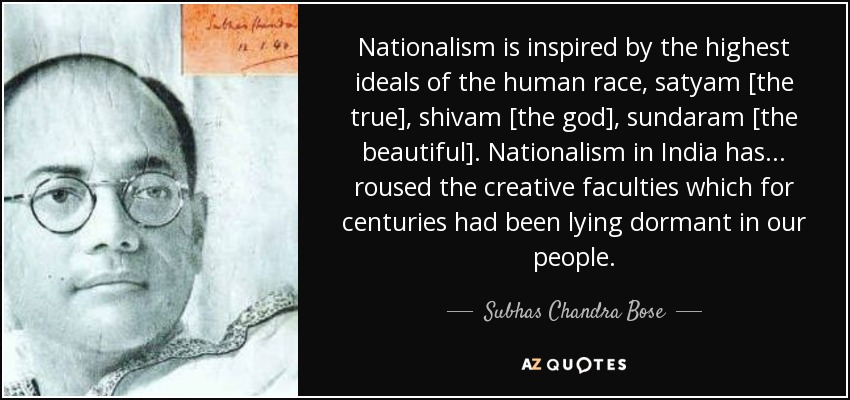Lately we’ve been inundated with lectures on nationalism and patriotism. It’s ironical though suddenly these terms are getting primetime not only in the media and break room discussions, but also in the parliament. The irony is in the context in which these terms are being used and misused by everyone from politicians to writers and poets and a wide plethora of intellectuals. Not only are these terms being rampantly dragged into any discussion, with or without any relevance, Tagore and Gandhi are being cited and quoted liberally to justify points on either sides of heated debates to define and understand the “real” meanings of these terms.
The
context, as anyone would guess, given the timing, is the recent incident in the
JNU campus, where few people were involved in sloganeering things like, “Hindustan ki badbaadi tak yeh jung”,
this fight is till India is finished. As has been established beyond any doubt
by Smriti Irani in the parliament in her fiery speech, the organizers of the
event had taken permission from the JNU authority to hold an event for recital of
poems, but later it transpired to be an event in support of Afzal Guru, who was
hung in the recent past as per the orders of the Supreme Court of the India, after
a prolonged trial for his involvement in the attack on the Indian Parliament.
BJP
has termed the event antinational, amounting to sedition. Even if we chose to
ignore the barks from the opposition, whom you may dismiss as intellectually
starved and ethically blind, you can’t take the same stand for people like
Girish Karnad, who had to descend on the streets of Bangalore to show
solidarity to the JNU students who vouched for their fight to finish India.
As has always been the case in the
recent past, the intellectuals have often felt their freedom of speech has been
curbed. Here too, they have descended on the streets to protect India from the
hands of the fascists, read Narendra Modi and BJP, who have the audacity to
call those passionate and free thinking kids of JNU, fighting selflessly to
finish India, antinational. How dare they? The intellectuals have asked. Isn’t
it the birth right of anyone in a free democracy to express anything they feel
like to? How can you question the nationalism and patriotic fervor of those
fearless young souls?
The intellectuals are worried the clear stream of reason will
perhaps lose its way, the mind won’t be perhaps led forward into ever-widening
thought and action and our country may not awake into the heaven of freedom.
Tagore comes handy in such occasions. Had he not written the poem, Where the
mind is without fear, the vociferous supporters of freedom in every form would
have had a tough time in occasions like the JNU sloganeering and students’
fight for India’s barbaadi.
When it comes to Tagore,
unquestionably, the Bengalis naturally claim to be the legal heirs of his
legacy. So, not surprisingly, Sugata Bose, the grand nephew of none other than
Netaji Subhas Chandra Bose, and also a present MP from the Trinamool Congress, gave
a soundful speech at the Parliament on nationalism and patriotism, with lofty
quotes from Tagore. Interestingly, Sugata Bose represents the constituency of
Jadavpur University, which was founded during the days of the Swadeshi movement,
as a college with Aurobindo (then Ghosh) as the principal.
“The nationalism that is being talked
about from the other side of the House”, Sugata said in the parliament, “represents
centralized despotism and it is talking about a rigidly unitarian imperial state.
[Tagore] composed our national anthem but he was also a powerful critic of
nationalism. Tagore knew that nationalism can be both a boon and a curse… I
sometimes fear that those who are defining nationalism so narrowly will end up
one day describing Rabindranath Tagore, the composer of our national anthem, as
anti-national, if they read some of these sentences in his book on nationalism.”
So essentially Sugata was trying to
say, quoting Tagore intelligently, that the sort of nationalism the BJP and its
unitarian allies espouse, and which might have instigated them to call those
bright young brains of JNU antinational, is not the true form of nationalism.
Indirectly, he was also trying to say that the sort of nationalism the
opposition and the likes of Girish Karnad and many other academicians,
intellectuals, teachers etc. espouse is the right one.
Sugata is not the only one. A quick
search in the internet will land you on many articles replete with similar thoughts
that even if someone pledges to wage a war till he ensures India’s barbaadi,
still his nationalism can’t be doubted.
That’s where it’s important to know
what Tagore actually said. It’s not that what Tagore or Gandhi have said are
sacrosanct and that anything else has to be thrown away in the garbage bin. But
we can indeed get a good perspective from some thoughtful minds who have spent
their whole lives to think big and good about India.
Yes, it’s true that Tagore’s idea of
nationalism was not always the same as that of Gandhi’s. His novel Ghare Baire,
Home and the World, depicts a classic confrontation between two schools of
nationalism through the two main characters Nikhil and Sandip. Nikhil, a
zamindar, is against the boycott of the English goods as he feels the poor
farmers can’t afford to buy the costlier swadesi products of inferior quality.
Contrary to him is Sandip, a fiery revolutionary, who doesn’t even mind
resorting to violence for the sake of his country. Nikhil’s point is that
nationalism at the cost of the basic standard of living of the poor farmers is
unacceptable. Sandip represents the Swadeshi movement we know of.
It’s clear what Tagore wants to say
by the two sides. Nikhil’s nationalism is at the grass root level, where the
wellbeing of his people can’t be compromised for the sake of any lofty ideal.
Sandip’s nationalism borders to arrogance, perhaps the type Sugata wanted to
denounce in his speech, and the sort which he might have referred to as centralized
despotism, unitarian and imperial. It’s true that nationalism often smacks of
arrogance and BJP’s actions and gestures in many cases might have been
arrogant. But that doesn’t mean that the young minds who want to fight till
Hindustan’s barbaadi is another form of nationalism. In the context of Ghare
Baire, Nikhil’s opposition to the so called swadeshi movement is by no way
connected to anyone’s barbaadi. Rather, he is more concerned about his poor
subjects, his zamndari. His love for his own land, his own people doesn’t allow
him to get swayed away by anything.
English words like nationalism and
patriotism don’t have an exact Indian counterpart. The words which come close
to both are perhaps deshatmabodha and
deshaprema. Deshatmavoda, when broken down, yields desha, atma and bodha. So essentially it’s the bodha or consciousness of seeing the desha, the country, as your own soul, atma. Desha-prema is simpler. It means
the love for the country.
It can be argued that a person who
loves his country may not necessarily always sing odes to his country. He may
be very well a critic and may point out all the wrongs or evils happening in
his country. Country always needs such people who point fingers to all the
wrongs, so that the wrong doers can rectify themselves and help create a better
country. So here too, the motive behind criticizing is an underlying love for the
country.
When someone says he wants to fight
till his country is finished, I wonder, is his desiring to see a better
country? Even the most illogical person will realize the motive behind such a
thing can’t be his love for the country. It’s the hatred that wants to “finish”
something.
It can be argued what if someone
doesn’t love his country, can he be hounded for his feelings? Democracy gives
anyone the right to love or hate. Why can’t he hate his country? True. You can
very well hate your country and shout at the top of your voice. But it can’t be
then termed as nationalism. It can’t be either desh-atma-bodha or desha-prema.
So going by the Indian words for nationalism or patriotism, shouting for
India’s barbaadi can’t be nationalism, from any angle. And if it’s not, then
the antonym for desha-prema is desha-droha. So what’s the wrong in calling
those JNU students, who were shouting, “Hindustan ki badbaadi
tak yeh jung”,
desha-drohi, anti-national?
Whether the JNU students can be
booked for treason or sedition is an altogether different thing which the
judiciary has to handle. It’s not the business of the opposition or the likes
of Girush Karnad and Ramachandra Guha or anyone else to comment on that, like
it’s no one’s business to say that the Supreme Court was wrong in convicting
Afzal Guru. You may hate the country, but rubbishing its Supreme Court is more
dangerous than anything else. Such things attack the very foundation of the
country and will surely cause India’s barbaadi, which is exactly what the JNU
students want to fight a jung for.
Finally, let’s see if such things can
be accepted as freedom of speech. Alongside the concept of freedom, which
essentially means boundlessness, there’s also another aspect of freedom whose
embrace is, in Tagore’s words, ‘in a
thousand bonds of delight’. He says, ‘Thou ever pourest for me the fresh
draught of thy wine of various colors and fragrance, filling this earthen
vessel to the brim. My world will light its hundred different lamps with thy
flame and place them before the altar of thy temple.’ This essentially refers
to some binding that’s necessary to ‘feel the embrace of freedom’, enjoy the
various diversities of the nature in the form of the hundred different lamps, the various colors and fragrance. In
an essay Tagore explains you need to “bind” the strings of a sitar to
“liberate” the diverse notes of music. So essentially, freedom without any
restrain, binding, is as dangerous as the lack of it. It’s like a boat without
an oar drifting in the middle of an ocean. In the same way, freedom of speech
without any constrain and restrain is a dangerous thing.
Not everything and anything can be
accepted in the name of freedom. Shouting for India’s barbaadi is not freedom of
speech. It’s nonsense. It can’t be tolerated, like it can’t be tolerated if
someone uses filthy and sexually explicit language in front of a woman. Going
by the logic that as long as any action or speech doesn’t create any violence,
you can’t book anyone for sedition or treason, outraging the modesty of a woman
should have been restricted only to physical violence, which in this case would
be rape. But wouldn’t it be disgusting to argue in that way? So why someone
shouting for India’s barbaadi wouldn’t be disgusting, even if he’s not causing
any physical harm or violence? Period.









No comments:
Post a Comment